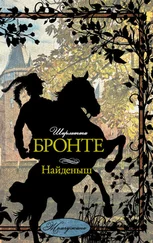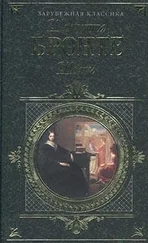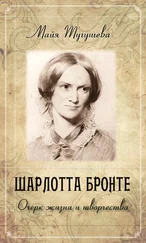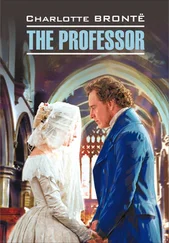Шарлотта Бронте - The Professor
Здесь есть возможность читать онлайн «Шарлотта Бронте - The Professor» — ознакомительный отрывок электронной книги совершенно бесплатно, а после прочтения отрывка купить полную версию. В некоторых случаях можно слушать аудио, скачать через торрент в формате fb2 и присутствует краткое содержание. Год выпуска: 2014, Издательство: epubBooks Classics, Жанр: Классическая проза, на английском языке. Описание произведения, (предисловие) а так же отзывы посетителей доступны на портале библиотеки ЛибКат.
- Название:The Professor
- Автор:
- Издательство:epubBooks Classics
- Жанр:
- Год:2014
- ISBN:нет данных
- Рейтинг книги:3 / 5. Голосов: 1
-
Избранное:Добавить в избранное
- Отзывы:
-
Ваша оценка:
- 60
- 1
- 2
- 3
- 4
- 5
The Professor: краткое содержание, описание и аннотация
Предлагаем к чтению аннотацию, описание, краткое содержание или предисловие (зависит от того, что написал сам автор книги «The Professor»). Если вы не нашли необходимую информацию о книге — напишите в комментариях, мы постараемся отыскать её.
The Professor — читать онлайн ознакомительный отрывок
Ниже представлен текст книги, разбитый по страницам. Система сохранения места последней прочитанной страницы, позволяет с удобством читать онлайн бесплатно книгу «The Professor», без необходимости каждый раз заново искать на чём Вы остановились. Поставьте закладку, и сможете в любой момент перейти на страницу, на которой закончили чтение.
Интервал:
Закладка:
"No more did the French at Waterloo," said Hunsden.
"There is no comparison between the cases," rejoined Frances; "mine was a sham fight."
"Sham or real, it's up with you."
"No; though I have neither logic nor wealth of words, yet in a case where my opinion really differed from yours, I would adhere to it when I had not another word to say in its defence; you should be baffled by dumb determination. You speak of Waterloo; your Wellington ought to have been conquered there, according to Napoleon; but he persevered in spite of the laws of war, and was victorious in defiance of military tactics. I would do as he did."
"I'll be bound for it you would; probably you have some of the same sort of stubborn stuff in you."
"I should be sorry if I had not; he and Tell were brothers, and I'd scorn the Swiss, man or woman, who had none of the much–enduring nature of our heroic William in his soul."
"If Tell was like Wellington, he was an ass."
"Does not ASS mean BAUDET?" asked Frances, turning to me.
"No, no," replied I, "it means an ESPRIT–FORT; and now," I continued, as I saw that fresh occasion of strife was brewing between these two, "it is high time to go."
Hunsden rose. "Good bye," said he to Frances; "I shall be off for this glorious England to–morrow, and it may be twelve months or more before I come to Brussels again; whenever I do come I'll seek you out, and you shall see if I don't find means to make you fiercer than a dragon. You've done pretty well this evening, but next interview you shall challenge me outright. Meantime you're doomed to become Mrs. William Crimsworth, I suppose; poor young lady? but you have a spark of spirit; cherish it, and give the Professor the full benefit thereof."
"Are you married. Mr. Hunsden?" asked Frances, suddenly.
"No. I should have thought you might have guessed I was a Benedict by my look."
"Well, whenever you marry don't take a wife out of Switzerland; for if you begin blaspheming Helvetia, and cursing the cantons—above all, if you mention the word ASS in the same breath with the name Tell (for ass IS baudet, I know; though Monsieur is pleased to translate it ESPRIT–FORT) your mountain maid will some night smother her Breton–bretonnant, even as your own Shakspeare's Othello smothered Desdemona."
"I am warned," said Hunsden; "and so are you, lad," (nodding to me). "I hope yet to hear of a travesty of the Moor and his gentle lady, in which the parts shall be reversed according to the plan just sketched—you, however, being in my nightcap. Farewell, mademoiselle!" He bowed on her hand, absolutely like Sir Charles Grandison on that of Harriet Byron; adding—"Death from such fingers would not be without charms."
"Mon Dieu!" murmured Frances, opening her large eyes and lifting her distinctly arched brows; "c'est qu'il fait des compliments! je ne m'y suis pas attendu." She smiled, half in ire, half in mirth, curtsied with foreign grace, and so they parted.
No sooner had we got into the street than Hunsden collared me.
"And that is your lace–mender?" said he; "and you reckon you have done a fine, magnanimous thing in offering to marry her? You, a scion of Seacombe, have proved your disdain of social distinctions by taking up with an ouvriere! And I pitied the fellow, thinking his feelings had misled him, and that he had hurt himself by contracting a low match!"
"Just let go my collar, Hunsden."
"On the contrary, he swayed me to and fro; so I grappled him round the waist. It was dark; the street lonely and lampless. We had then a tug for it; and after we had both rolled on the pavement, and with difficulty picked ourselves up, we agreed to walk on more soberly.
"Yes, that's my lace–mender," said I; "and she is to be mine for life—God willing."
"God is not willing—you can't suppose it; what business have you to be suited so well with a partner? And she treats you with a sort of respect, too, and says, 'Monsieur' and modulates her tone in addressing you, actually, as if you were something superior! She could not evince more deference to such a one as I, were she favoured by fortune to the supreme extent of being my choice instead of yours."
"Hunsden, you're a puppy. But you've only seen the title–page of my happiness; you don't know the tale that follows; you cannot conceive the interest and sweet variety and thrilling excitement of the narrative."
Hunsden—speaking low and deep, for we had now entered a busier street—desired me to hold my peace, threatening to do something dreadful if I stimulated his wrath further by boasting. I laughed till my sides ached. We soon reached his hotel; before he entered it, he said—
"Don't be vainglorious. Your lace–mender is too good for you, but not good enough for me; neither physically nor morally does she come up to my ideal of a woman. No; I dream of something far beyond that pale–faced, excitable little Helvetian (by–the–by she has infinitely more of the nervous, mobile Parisienne in her than of the the robust 'jungfrau'). Your Mdlle. Henri is in person "chetive", in mind "sans caractere", compared with the queen of my visions. You, indeed, may put up with that "minois chiffone"; but when I marry I must have straighter and more harmonious features, to say nothing of a nobler and better developed shape than that perverse, ill–thriven child can boast."
"Bribe a seraph to fetch you a coal of fire from heaven, if you will," said I, "and with it kindle life in the tallest, fattest, most boneless, fullest–blooded of Ruben's painted women—leave me only my Alpine peri, and I'll not envy you."
With a simultaneous movement, each turned his back on the other. Neither said "God bless you;" yet on the morrow the sea was to roll between us.
Chapter XXV.
IN two months more Frances had fulfilled the time of mourning for her aunt. One January morning—the first of the new year holidays—I went in a fiacre, accompanied only by M. Vandenhuten, to the Rue Notre Dame aux Neiges, and having alighted alone and walked upstairs, I found Frances apparently waiting for me, dressed in a style scarcely appropriate to that cold, bright, frosty day. Never till now had I seen her attired in any other than black or sad–coloured stuff; and there she stood by the window, clad all in white, and white of a most diaphanous texture; her array was very simple, to be sure, but it looked imposing and festal because it was so clear, full, and floating; a veil shadowed her head, and hung below her knee; a little wreath of pink flowers fastened it to her thickly tressed Grecian plait, and thence it fell softly on each side of her face. Singular to state, she was, or had been crying; when I asked her if she were ready, she said "Yes, monsieur," with something very like a checked sob; and when I took a shawl, which lay on the table, and folded it round her, not only did tear after tear course unbidden down her cheek, but she shook to my ministration like a reed. I said I was sorry to see her in such low spirits, and requested to be allowed an insight into the origin thereof. She only said, "It was impossible to help it," and then voluntarily, though hurriedly, putting her hand into mine, accompanied me out of the room, and ran downstairs with a quick, uncertain step, like one who was eager to get some formidable piece of business over. I put her into the fiacre. M. Vandenhuten received her, and seated her beside himself; we drove all together to the Protestant chapel, went through a certain service in the Common Prayer Book, and she and I came out married. M. Vandenhuten had given the bride away.
We took no bridal trip; our modesty, screened by the peaceful obscurity of our station, and the pleasant isolation of our circumstances, did not exact that additional precaution. We repaired at once to a small house I had taken in the faubourg nearest to that part of the city where the scene of our avocations lay.
Читать дальшеИнтервал:
Закладка:
Похожие книги на «The Professor»
Представляем Вашему вниманию похожие книги на «The Professor» списком для выбора. Мы отобрали схожую по названию и смыслу литературу в надежде предоставить читателям больше вариантов отыскать новые, интересные, ещё непрочитанные произведения.
Обсуждение, отзывы о книге «The Professor» и просто собственные мнения читателей. Оставьте ваши комментарии, напишите, что Вы думаете о произведении, его смысле или главных героях. Укажите что конкретно понравилось, а что нет, и почему Вы так считаете.











